Cusabio Human Recombinants
Recombinant Human Tumor necrosis factor receptor superfamily member 1B (TNFRSF1B), partial | CSB-YP023978HU2
- SKU:
- CSB-YP023978HU2
- Availability:
- 25 - 35 Working Days
Description
Recombinant Human Tumor necrosis factor receptor superfamily member 1B (TNFRSF1B), partial | CSB-YP023978HU2 | Cusabio
Alternative Name(s): Tumor necrosis factor receptor 2 ;TNF-R2Tumor necrosis factor receptor type II ;TNF-RII ;TNFR-IIp75p80 TNF-alpha receptor; CD120bINN: Etanercept
Gene Names: TNFRSF1B
Research Areas: Cell Biology
Organism: Homo sapiens (Human)
AA Sequence: LPAQVAFTPYAPEPGSTCRLREYYDQTAQMCCSKCSPGQHAKVFCTKTSDTVCDSCEDSTYTQLWNWVPECLSCGSRCSSDQVETQACTREQNRICTCRPGWYCALSKQEGCRLCAPLRKCRPGFGVARPGTETSDVVCKPCAPGTFSNTTSSTDICRPHQICNVVAIPGNASMDAVCTSTSPTRSMAPGAVHLPQPVSTRSQHTQPTPEPSTAPSTSFLLPMGPSPPAEGSTGD
Source: Yeast
Tag Info: C-terminal 6xHis-tagged
Expression Region: 23-257aa
Sequence Info: Partial
MW: 25.9 kDa
Purity: Greater than 85% as determined by SDS-PAGE.
Relevance: Receptor with high affinity for TNFSF2/TNF-alpha and approximately 5-fold lower affinity for homotrimeric TNFSF1/lymphotoxin-alpha. The TRAF1/TRAF2 complex recruits the apoptotic suppressors BIRC2 and BIRC3 to TNFRSF1B/TNFR2. This receptor mediates most of the metabolic effects of TNF-alpha. Isoform 2 blocks TNF-alpha-induced apoptosis, which suggests that it regulates TNF-alpha function by antagonizing its biological activity.
Reference: A second tumor necrosis factor receptor gene product can shed a naturally occurring tumor necrosis factor inhibitor.Kohno T., Brewer M.T., Baker S.L., Schwartz P.E., King M.W., Hale K.K., Squires C.H., Thompson R.C., Vannice J.L.Proc. Natl. Acad. Sci. U.S.A. 87:8331-8335(1990)
Storage: The shelf life is related to many factors, storage state, buffer ingredients, storage temperature and the stability of the protein itself. Generally, the shelf life of liquid form is 6 months at -20?/-80?. The shelf life of lyophilized form is 12 months at -20?/-80?.
Notes: Repeated freezing and thawing is not recommended. Store working aliquots at 4? for up to one week.
Function: Receptor with high affinity for TNFSF2/TNF-alpha and approximately 5-fold lower affinity for homotrimeric TNFSF1/lymphotoxin-alpha. The TRAF1/TRAF2 complex recruits the apoptotic suppressors BIRC2 and BIRC3 to TNFRSF1B/TNFR2. This receptor mediates most of the metabolic effects of TNF-alpha. Isoform 2 blocks TNF-alpha-induced apoptosis, which suggests that it regulates TNF-alpha function by antagonizing its biological activity.
Involvement in disease:
Subcellular Location: Isoform 1: Cell membrane, Single-pass type I membrane protein, SUBCELLULAR LOCATION: Isoform 2: Secreted, SUBCELLULAR LOCATION: Tumor necrosis factor-binding protein 2: Secreted
Protein Families:
Tissue Specificity:
Paythway: TNFsignalingpathway
Form: Liquid or Lyophilized powder
Buffer: If the delivery form is liquid, the default storage buffer is Tris/PBS-based buffer, 5%-50% glycerol. If the delivery form is lyophilized powder, the buffer before lyophilization is Tris/PBS-based buffer, 6% Trehalose, pH 8.0.
Reconstitution: We recommend that this vial be briefly centrifuged prior to opening to bring the contents to the bottom. Please reconstitute protein in deionized sterile water to a concentration of 0.1-1.0 mg/mL.We recommend to add 5-50% of glycerol (final concentration) and aliquot for long-term storage at -20?/-80?. Our default final concentration of glycerol is 50%. Customers could use it as reference.
Uniprot ID: P20333
HGNC Database Link: HGNC
UniGene Database Link: UniGene
KEGG Database Link: KEGG
STRING Database Link: STRING
OMIM Database Link: OMIM









